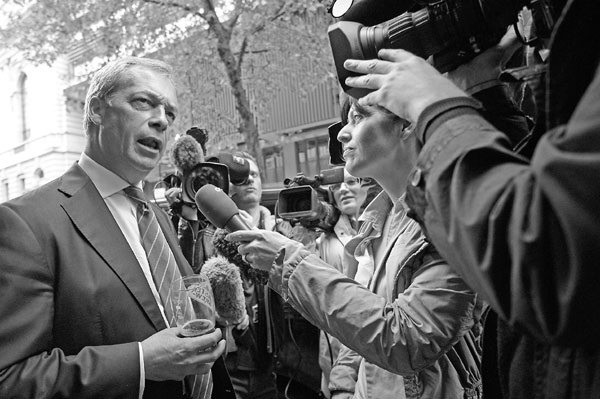UK debates future in EU after election shock
Britain has been embarked on a new round of heated debate on its EU membership after the Euroskeptic UK Independence Party landed a "historic" victory in European elections over the weekend.
UKIP, a party without a single seat in Britain's national parliament, became the first political grouping other than Prime Minister David Cameron's Conservatives and the opposition Labour Party to win a nationwide election for more than a century.
Official figures put the turnout for the elections in Britain at just 34.2 percent.
|
UK Independence Party leader Nigel Farage (left) speaks to the media as he drinks a pint of ale outside a pub before walking to a news conference in central London on Monday. Carl Court / Agence France-Presse |
On Monday, Cameron spoke to several European leaders, including German Chancellor Angela Merkel, and urged them to back his calls for reform of the EU.
"The turnout and results ... have underlined the need for reform to ensure that the EU is doing more to deliver what voters care about: jobs, growth and a better future," he said.
UKIP, which wants Britain to pull out of the EU, won 27.5 percent of the vote, giving it 24 seats in the European Parliament. The main opposition Labour Party came second, with 25.4 percent and 20 seats.
Cameron's Conservatives were pushed into third place on just short of 24 percent, landing them 19 seats.
It was a disastrous night for the pro-EU Liberal Democrats, the national coalition partners who were reduced to a single seat - two fewer than the Green Party.
With only two seats in Northern Ireland still to be declared, UKIP were assured of what their leader Nigel Farage had already called on Sunday "the most extraordinary result in British politics for 100 years".
UKIP even picked up a European seat in Scotland, where it has no tradition of support, which Farage said showed it was now a genuinely national force.
"Up until now, European integration always seemed to be inevitable and I think that inevitability will end with this result," Farage said.
A seat in Westminster
UKIP will now try to capitalize on its success in the European vote and a strong showing in local council elections last week by targeting its first Westminster seat in a by-election in Newark, central England, on June 5.
While UKIP benefited from the system of proportional representation used in the European vote, Britain's first-past-the-post system for general elections counts against it.
Cameron said the outcome showed the importance of his promise to re-negotiate the terms of Britain's EU membership and then put the deal to an in-out referendum if he wins the general election in May 2015.
"People are deeply disillusioned with the European Union," the prime minister told BBC radio.
But Cameron rebuffed calls from some of his backbenchers to form an electoral alliance with UKIP for the general election, saying, "We don't do pacts and deals."
The Liberal Democrats, meanwhile, were left to survey the wreckage of an election that has been a strong point for them in the past.
Deputy Prime Minister Nick Clegg, who had engaged with Farage in two televised debates before the election, admitted the result was "gutting" but insisted he had no intention of "walking away", despite calls for his resignation from within his party.
(China Daily 05/28/2014 page11)













